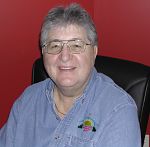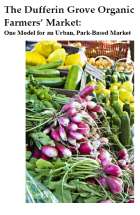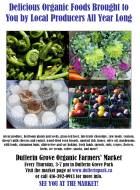
Pages in this Folder:

Related Folders:
See also Department Site Map
Publications:
Market-related videos
Comments?
For the basics, see
- Website & Privacy Policies
- How To Get Involved
- The Role of the Park
Search options:
Department Site Map
Custodians:
Feeling Confused?
posted June 03, 2007

Bob Chorney
Farmers' Markets Ontario
If you picked up The Star last Wednesday [May 30, 2007] or tuned in to Metro Morning a couple of days later, you might be feeling more wary about buying a head of lettuce than a used car.
"Unbeknownst to some unsuspecting shoppers, our markets have been quietly infiltrated by resellers, a.k.a. produce jockeys, peddlers and hucksters," says Jennifer Bain in her "Bringing Country Food to the City" article. That "produce jockeys..." phrase comes straight from Bob Chorney, the head of Farmers' Markets Ontario, who shared his concern about "people living in condos and driving fancy cars" posing as farmers at markets in an early morning interview on CBC.
It's true, if you travel around to markets and even farmstands, you can find some fakers out there alongside hardworking farmers, and that's a shame. Too bad, though, that these comments in the media could leave people feeling more suspicious than excited about heading out to markets.
If you're a newcomer or infrequent market visitor, there are two current phrases in particular that might need some clarification: "certified farmers' market" and "local is the new organic".
The markets opening this season at Liberty Village and Woodbine Shopping Mall are using a term common in California but new to this region. "Certified Farmers" in this context means that all vendors have been checked to see that they really produce the food they sell. A list of documents, including farm fuel bills, pesticide receipts (as most farms are conventional), property tax or land rental statements, etc. is required, and an inspector hired by the market organizer will visit the farms. The purpose of this inspection is to verify authenticity, so that dishonest vendors posing as farmers cannot sell wares they have purchased rather than produced.
"Certified", when it's used at Dufferin (and most other markets), means certified organic, and that's a process which also involves inspections, but for a different purpose, i.e. verifying that the food has been produced without chemical fertilizers, pesticides, growth hormones or GMOs, that animals are raised humanely, that soil-preserving crop rotation plans are followed, and that a careful paper trail can show the source of all produce. Most, but not all our farms are certified organic. All follow these principles as closely as possible. Recently Greenfields and Feast of Fields Farms also became "Local Flavour Plus" certified. Fair labour practices and overall environmental stewardship are included in this assessment.
As far as proving authenticity, we have had the great pleasure of many discussions, visits to farms, and open answers to questions, and you are welcome and encouraged to join in.

Plan B Organics
Unlike summer-only markets, our year-round market does depend on some produce additional to our growers' own (from our region and beyond) to complement their supply beyond the growing season. The main two farms which bring this additional produce along with their own are Greenfields and Plan B. Many customers ask for some continued supply of organic fruit into the summer, as there are periods when we would have little or no fruit available at the market otherwise. Local comes first, though, and within the growing season a minimum of 70% of what's on the table must come from growers' own farms. This arrangement also leaves room for partnerships among farms. For example, Ute Zell brings Fenwood Farms chicken to the market along with her goat and wild boar, and that helps both farms. Again, your questions are very welcome. We are trying to foster an open, direct connection between producers and consumers.
Another big difference between a market like ours and the "certified-farmer" model is that in addition to farmers, we include some city-based vendors. They're part of our urban food picture, part of the fun, and we like the links between city and country that develop this way. For example, this summer the Sosnickis are growing a special variety of beets for Alli the baker to use in her deep red beet bread. We also support connections to farmers elsewhere through fair-trade products, such as Whole World's organic teas and spices.
Now, what about "local is the new organic"? Reducing our food miles and keeping regional farmers on the land are tremendously important, and big, corporate organic is certainly not a dream come true, but let's not get confused here. Farmers and others have worked for many years to develop meaningful, high standards for organic production. Forget trendy. Let's support all our regional farmers by including more local food in our diets, but let's contribute to a sustainable future by asking for food that's both local and organic.
Anne Freeman





 Printer friendly version
Printer friendly version